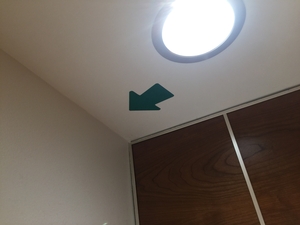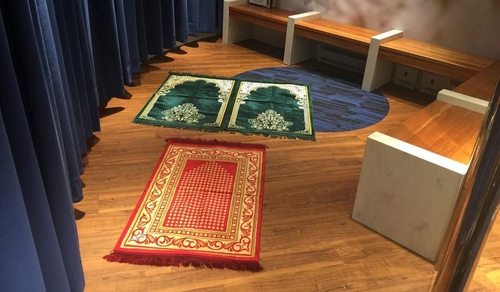
The Quiet Room's external signage. © Daniel Pipes
This item is available on the Militant Islam Monitor website, at http://www.militantislammonitor.org/article/id/7858
Muslimah PHL CAO Soledad Alfaro Appears To View Dua As Diversity - Alerted PHL Detective When Queried By Author
August 17, 2020
Disquiet about Philadelphia Airport's "Quiet Room"
Taxpayer money should not be used to favor one religion over others in government facilities such as PHLby Daniel Pipes
Washington TimesAugust 17,2020
[WT title: "Disquiet about Favoring Islam in Philadelphia Airport's 'Quiet Room'"]
Philadelphia International Airport (PHL) opened a heavily promoted "Quiet Room" in August 2018. Accessible 365/24/7, it's an excellent addition to a frenetic travel hub. But it also presents a disquieting problem.
The 315-square-foot space with two chambers is located after security controls, between the D and E terminals. A PHL press release touts the room as "a place of silence which all passengers may use regardless of their worldview, culture and religious affiliation," an area suitable for "those who desire a place for solitude or prayer." What could be wrong with that?

The Quiet Room's external signage. © Daniel Pipes |
Well, it's the same problem that has turned up in schools, hospitals, at airport security, and more broadly: Islam enjoys a favored status. The Quiet Room privileges it in four ways:
First, the room's name, announced in five languages, presents a problem:
For Arabic readers, ghurfat as-salat, غرفة الصلاة, turns the room from the airport's ostensible "place of silence" into a place of religion for the Arabic name implies a place exclusively for Muslim prayer; no Christian prays in a room called ghurfat as-salat. The sign dog-whistles Arabophones about an Islamic prayer space at PHL.
Second, the room contains many Islamic artifacts, some with official-looking markings (e.g., prayer rugs marked with "PHL Airport").

The PHL footbath is "provided mainly for Muslim users." © Daniel Pipes |
Third, the room contains exclusively built-in Islamic amenities. For starters, the airport announces that "The Quiet Room contains a footbath for those passengers who require cleansing before prayer." The room's designers, Roya Taheri and Massoud Mohadjeri of Taheri Architects, explicitly acknowledge that "A Foot Bath is provided mainly for Muslim users to perform ablution prior to prayer."
In addition, Taheri Architects notes that "The Foot Bath directs the passenger to a small prayer corner with an inset carpet in the direction of Qibla" (the direction of Mecca, which Muslims face while praying). Finally, a green arrow on the ceiling points to Mecca.
Fourth, the room is empty, with benches along the wall but lacking chairs or pews, making it mainly suitable for Muslim prayers.
In favoring Islam over other religions, the Quiet Room fits a pattern of U.S. airports. Those in Kansas City and Indianapolis have footbaths. The one in Minneapolis-St. Paul devised an elaborate (but aborted) scheme of differentcolored lights atop taxis to accommodate Muslim drivers unwilling to transport passengers carrying alcohol.

The PHL qibla, pointing to Mecca. © Daniel Pipes |
But this pattern is wrong. Government facilities such as PHL, a wholly-owned unit of the City of Philadelphia, must stick to the principle that American Muslims have the same rights and duties as the citizens (and travelers) of other faiths; they do not have special rights. This means that government agencies may make a space available for religious use (e.g., chapels, footbaths) but they may not use taxpayer monies to pay for or maintain it.
In this spirit, I asked PHL to make four modifications to render the Quiet Room genuinely ecumenical:
After nine months of discussions, airport CEO Rochelle Cameron agreed to #1 (English will be the only language on signs) and #2 (a sign will be added distancing the airport from private gifts). PHL partly agreed to #3 (the qibla has been removed) and partly refused ("we do not accept the premise that the footbath is a religious symbol endorsing one faith over others" and the inset carpet "contains no obvious religious symbol of any kind"). Cameron rejected #4 (no chairs will be added).
I thank PHL for this positive response but ask that it complete the necessary changes. Three remaining features contradict the First Amendment of the U.S. Constitution forbidding the government from the "establishment of religion": the City of Philadelphia must not provide and maintain the footbath and inset carpet, nor keep the Quiet Room devoid of chairs.
PHL's Quiet Room is a small issue but, as this anti-racist moment reminds us, social justice is achieved one small step at a time.
Mr. Pipes (DanielPipes.org, @DanielPipes) is president of the Middle East Forum. © 2020 by Daniel Pipes. All rights reserved.
Aug. 17, 2020 addenda:
(1) Please write airport CEO Rochelle Cameron at [email protected] with your thoughts on the Quiet Room and please copy me at [email protected]. This is doubly helpful if you either live in Philadelphia or use PHL.
(2) On visits to the Quiet Room in 2019, I found prayer rugs, Korans, a kufi (male Islamic head covering), and a turba (a tablet Shi'a Muslim use when praying) inscribed with the words "Ya Husayn" on it, a reference to the Islamic prophet's grandson. The Bible and Koran carried stickers, "Donated Holy Book, PHL Airport Quiet Room, Please Do Not Remove." These appeared to be official PHL artifacts; thus my request that the airport clearly signal that they are private donations.

Prayer rugs in the small Quiet Room at PHL. © Daniel Pipes |
(3) When I first noted the anomalous "Prayer Room" sign in October 2018, I addressed a tweet to the airport, "Now alerted to this discrepancy, will you change the Arabic?"
I received no reply.
(4) A year later, I wrote to Soledad Alfaro, the airport's chief administrative officer, inquiring about the signage, the amenities, and her personal role in these anomalies. Alfaro did not reply. Instead, I heard back from a police detective at the Airport Unit, Michael Wojciechowski. He threateningly informed me in an e-mail that he "read your emails," "visited your website," and that "the airport is questioning your intentions" in asking Alfaro about her role. I responded with "disbelief and outrage" at "this attempt at intimidation." I heard no more from the detective; instead, the airport's director of communications contacted me in a civil and constructive manner, beginning our negotiations. Eventually the airport's legal department took over.
http://www.danielpipes.org/19688/disquiet-about-philadelphia-airport-quiet-room
This item is available on the Militant Islam Monitor website, at http://www.militantislammonitor.org/article/id/7858